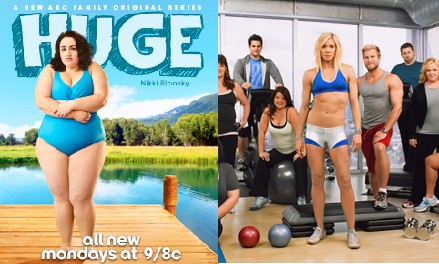
Mainstream pop culture’s back-and-forth, wishy-washy affair with body image is nothing new — but it seems to be rearing its head now more than ever. TV line-ups are springing up shows like “Huge” from ABC Family and the new fall series, “Mike & Molly” from CBS. At first glance, it’s easy for mainstream media to position these shows as positive movement on the body image front — one about teen girls learning to navigate life and love at fat camp, and the other about a couple that bonded at Overeaters Anonymous. I should admit that I’ve never personally seen “Huge,” brand new this summer, and despite the positive reviews I’ve skimmed, I’m skeptical. And I feel the same with the forthcoming “Mike & Molly.” Networks are being praised for giving the spotlight to plus-size actors, but is it necessary to make weight the primary focus of the plot?
This is the same fundamental issue we have with most non-mainstream figures carefully planted in mainstream media. The regular-sized models that are just beautiful women — yet, only get plus-size modeling gigs, drawing all the attention to their size. The differently-abled actors in film and television whose characters’ defining trait is almost always their disability. The “token Black guy” (or Asian-American girl, etc.) that, in a sea of sameness, seems blatantly planted to meet the unspoken diversity requirement.
I can’t say that shows like “Huge” or “Mike & Molly” are all bad — I’ll have to wait and watch them, and read more critical analysis about both. However, no matter how many commercials and TV shows tell women they should feel beautiful in their own skin, the messages are so incredibly mixed that even the positive ones are barely making a dent. And with shows like the wildly popular “Biggest Loser” and the upcoming “Thintervention with Jackie Warner,” TV’s mixed messages about body image continue to proliferate.
For more on this topic, check out what McClatchy-Tribune’s Luaine Lee says about the new weight-focused line-up and more in her article, Bigger is Getting to Be Better on TV Screens. A bold subject line indeed though she does attempt to discuss both sides of the issue.
What do you think?
Related content:
TV’s Fat and Happy. Not Quite.
The Reality Behind the Quest to be “The Biggest Loser”
What Reality TV Taught Me About Sluts, Waifs, Douchebags and Angry Black Women
The mission of Adios Barbie is to promote powerful self-image and identity in people of all cultures, races, genders, sexual orientations, abilities, ages and sizes. Much of the content is aimed to inspire discussion and even heated debate around our culture’s obsession with a singular ideal of beauty that leads us to care more about how we look than *who we are*. It is a site to contemplate, confront, and powerfully resist the contradictory and damaging messages that inform our identities daily.
What shocked me most, as someone who has suffered with eating problems in the past, was the use of the word ‘thintervention’.
As soon as I heard it, it reminded me of ‘thinspiration’: the use of pictures of often dangerously and often unrealistically thin women to spur on anorexics/bulimic on pro-ED websites. I get that it’s a pun. But I don’t think they thought that one through.
Also, why does that poor girl on the ‘Huge’ poster look so ashamed? She’s put there in a bathing suit for all to see, with a scared, passive look on her face, standing on the edge of a dock. Screams ‘vulnerable’. If she’s learning how to ‘navigate life and love’, I’m sure they could’ve found a much more positive depiction!
For one, Huge is about “teen girls” in the same sense that mixed doubles tennis is about women’s doubles tennis. Then, fatness isn’t the focus of Huge. It’s a show, about a bunch of fat kids, situated at a fat camp. I can see how one might assume it’s a show about fatness based on that, but the setting and fatness of the characters are just parts of the show.
The whole “Why does it have to be a big deal that they’re fat?” argument doesn’t make any sense to me. We don’t live in a world where a) that show would even be watched in reasonable numbers, b) that show would be a persuasive tool for fat activism, c) that show would be remotely realistic; rest of alphabet. Being fat, especially as a teenager, impacts your damn life; I don’t want a show about fat people where we pretend fat people are just big skinny people, that would be ignoring all kinds of privilege.
Huge might not be screaming FA from the rooftops (although Will comes close), but it’s a far deeper exploration of fatness than any Biggest Loser, Thintervention, etc. crap. And that exploration is great, the show would be toothless if it just glossed over fat issues. With a producer who reports having lurked FA blogs for years, and who has responded to discussion about the show and matters surrounding it on said blogs, so far Huge is the show we’ve been waiting for.
Sure, I’m still afraid the show will disappoint, we all are, and plenty of people have been prejudiced about the show, jaded by years of poor portrayals of fat, but it’s just lazy journalism to critique the fat politics of a show you haven’t even seen. Just because it’s the Internet doesn’t mean you should slap together sub-par content and go “Well, it’s just the Internet.” It doesn’t matter where you are, if you want your writing taken seriously, put in the work.